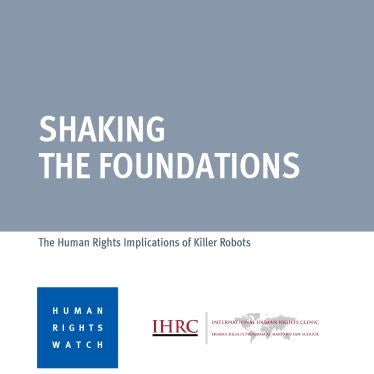(Washington, DC) – A letter from 68 Senators to President Barack Obama expressing strong support for a ban on antipersonnel mines should spur the administration to decide to join the Mine Ban Treaty this year, Human Rights Watch said. The letter, made public today, will be formally sent next week, along with an identical letter from members of the House of Representatives.
In late 2009, Obama initiated a comprehensive review of US landmine policy. The congressional letters express “strong support” for the decision to conduct a review and state, “We are confident that…the Administration can identify any obstacles to joining the [Mine Ban] Convention and develop a plan to overcome them as soon as possible.”
“More than two-thirds of the Senate and many in the House have now told the president that the US should join the Mine Ban Treaty, and that it can do so without endangering US national security,” said Steve Goose, Arms Division director at Human Rights Watch. “Joining the treaty is the right thing to do from both a humanitarian and a military perspective.”
In order for the US to join, two-thirds of the Senate must approve.
The Senate letter was organized by Senators Patrick Leahy (D–VT) and George Voinovich (R–OH), while the House letter was organized by Representatives Jim McGovern (D–MA) and Darrell Issa (R–CA). These came on the heels of a letter sent to Obama on March 22 by 65 nongovernmental organizations, including Human Rights Watch, urging a decision at the conclusion of the policy review to join the 1997 Mine Ban Treaty. The letter also urged Obama to submit the treaty to the Senate before the end of the year.
In 1994, the United States was the first nation to call for the “eventual elimination” of all antipersonnel mines, and the Clinton administration in 1998 set the objective of joining the treaty in 2006. But the Bush administration reversed course in 2004 and announced that it did not intend to join.
A total of 158 nations have joined the Mine Ban Treaty, which comprehensively bans antipersonnel mines, requires destruction of stockpiled mines within four years, and urges extensive programs to assist the victims of landmines. The letters note that the treaty “has led to a dramatic decline in the use, production, and export of antipersonnel mines.”
The United States and nearly all of the 36 other states that have not joined the treaty are in de facto compliance with most of its core prohibitions. The United States has not used antipersonnel mines since 1991, exported them since 1992, or produced them since 1997.
The congressional letters express concern at the potential harm to civilians from the indiscriminate nature of antipersonnel mines, including so-called “smart” or “non-persistent” mines that are designed to blow themselves up after a period of time. Under current US policy, set by the Bush administration, the United States will not use or retain non-self-destructing antipersonnel mines by the end of 2010, but self-destructing mines are still permitted indefinitely. The Mine Ban Treaty prohibits all antipersonnel mines, regardless of whether they self-destruct.
“Joining the Mine Ban Treaty would be a concrete and powerful example of the stated commitment of the US military to safeguard civilian lives during armed conflict,” said Goose.
The letters addressed two issues raised over the years by those who were hesitant to join the treaty. One is whether landmines would have to be removed from the Korean Demilitarized Zone (DMZ). The letters note that the antipersonnel mines there are the responsibility of South Korea, not the United States. If the United States joins the treaty, mines in the DMZ would not be affected. The United States would be able to maintain its military relationship with, and troop deployment in, South Korea, though it would not be able to assist South Korea with the use, production, stockpiling, or transfer of antipersonnel mines.
The other issue is whether the mines would have to be replaced with some other weapon. The letters note that “our NATO allies have addressed their force protection needs in accordance with their obligations under the Convention.” US military allies that joined the Mine Ban Treaty did not find it necessary to develop new weapons as alternatives to mines, but instead made changes in doctrine and tactics. The United States should do the same.
“The US has already gone without using these weapons for almost two decades,” Goose said. “It is time to make a commitment never to use them again.”
Human Rights Watch is a founding member of the International Campaign to Ban Landmines (ICBL), 1997 Nobel Peace Prize laureate. Human Rights Watch also serves on the steering committee of the United States Campaign to Ban Landmines (USCBL).






